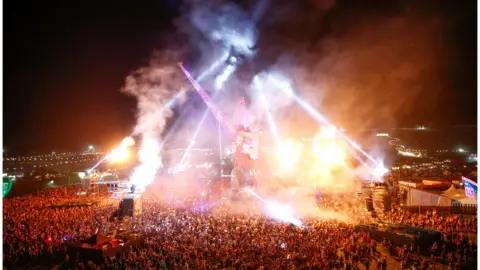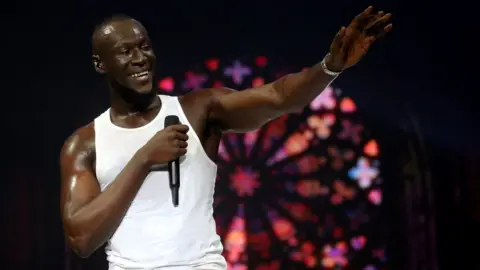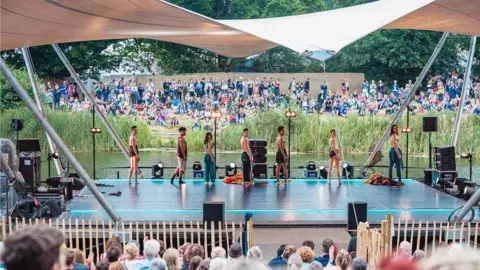Festival season 'still possible' despite Glastonbury cancellation
 Reuters
ReutersMusic festivals are "still possible" this summer, despite the cancellation of Glastonbury, says the head of the Association of Independent Festivals.
Paul Reed said Glastonbury "is a different beast to most festivals and most likely ran out of time due to the size and complexity of the event".
Smaller events could still happen if the government ensures organisers can access cancellation insurance, he said.
"For most festivals, the cut-off point is more likely the end of March."
On Thursday, Glastonbury organisers Michael and Emily Eavis called off their festival for the second year in a row because of the coronavirus pandemic.
"In spite of our efforts to move Heaven & Earth, it has become clear that we simply will not be able to make the festival happen," they said in a joint statement. "We are so sorry to let you all down."
Tickets for the festival, which normally attracts 200,000 people and was due to take place in June, will roll over to 2022.
Glastonbury is the UK's biggest music festival, but it was not the only event to cancel its plans on Thursday. The Country To Country festival, which was due to take place in March, also said its 2021 edition would not happen.
The three-day event, which attracts some of country music's biggest names to indoor venues in London, Dublin and Glasgow, said it had pulled the plug due to the "current restrictions on mass gatherings and international travel".
The announcements came as coronavirus deaths soared in England, with more than 8,500 deaths recorded in the past week. On Thursday, Prime Minister Boris Johnson said it was "too early" to say whether England's Covid restrictions would be lifted by the spring.
 PA Media
PA MediaGlastonbury's cancellation has raised fears for other music festivals this summer. However, the organisers of Glasgow's TRNSMT said there was "reason to be optimistic" that it could go ahead in July, with headliners Lewis Capaldi, Liam Gallagher and the Courteeners.
"Glastonbury is the biggest festival in the world and it's sad to see that, due to its enormous scale and taking several months to get the city-sized festival site ready, it's unable to go ahead this year," boss Geoff Ellis told Scotland's Daily Record.
"By comparison, TRNSMT is a much smaller city centre event with no camping. As such it takes us days rather than months to build TRNSMT. Therefore, we will continue to listen to and follow the advice from the government and remain positive about events later in the summer."
His comments were echoed by Bestival co-founder Rob Da Bank, who tweeted that "festival season will happen in the UK this summer", adding: "Sadly Glasto is such a mammoth beast to plan it ran outta time."
Sacha Lord, co-founder of Manchester's Parklife festival, added that Glastonbury's cancellation was "yet another blow" to freelancers who work in the live music sector.
Insurance problems
Speaking to BBC Breakfast on Friday, Mr Reed said the UK was at a "serious point in the pandemic and festivals only want to return when it is safe to do so".
He added that festivals were currently struggling to get insurance for coronavirus-related cancellations. Last week, MPs from the House of Commons culture select committee wrote to the chancellor, urging him to launch a Covid-19 insurance scheme to protect live music.
The appeal was backed by more than 100 industry figures, including organisers of the TRNSMT and Parklife festivals. "We do need government to intervene in this issue," said Mr Reed.
In a tweet on Thursday, Culture Secretary Oliver Dowden expressed his regret at Glastonbury's cancellation and said the government was "looking at problems around getting insurance".
A government spokeswoman said on Friday they are in "regular dialogue" with public health experts to "agree a realistic return date for festivals and other large events". They added they were still helping festivals with the £1.5bn Culture Recovery Fund, "with many already receiving this support".
 Teodora Andrisan
Teodora AndrisanOther European countries, including Austria and Germany, have launched schemes to cover events that cannot be rescheduled, including music festivals. At present, England has a scheme protecting film and TV shoots, but not music.
However, some festivals have been given support by the government's £1.57bn Culture Recovery Fund, including Womad, End of the Road and Nozstock.
Melvin Benn, whose company Festival Republic organises the Latitude, Download and the Reading & Leeds festivals, said that without an insurance scheme, other events would be left "staring into the same barrel that Glastonbury stared into".
"People can't afford to take that financial risk," he told BBC Radio 4's Today programme.
The government is holding "early stage talks" with insurers, confirmed Tim Thornhill of Tyser's Insurance, which counts Glastonbury amongst its clients.
'Significant urgency'
"We have helped to put in place the film and TV restart scheme, which the chancellor explained saved 14,000 jobs," he said. "So if we can do something for events, that would be welcome across the industry".
While there is "no guarantee" that insurance could be provided, he said there was "significant urgency" to finding a solution "within the next few months".
"It's really important that the government supports the industry," added Radiohead's Colin Greenwood. "And they need to start thinking about that now, and not when we reach that point - say in October this year - when there are enough people vaccinated for [live music] to become safe.
"Nobody wants to go to anything, or take part in anything, that's going to turn into a super-spreader event," he said.
"But obviously there has to be a way out of this, through vaccination. And I think we need to make sure that systems are in place so we can get back into doing what we love."
Julian Knight MP, chair of the culture select committee, said the government was working on insurance plans, because of the importance of festivals to British culture and the economy.
"I've been in to see the chancellor," he told BBC Radio 1 Newsbeat. "Finally I think there is some movement. I understand that they are dropping some of the objections that they may have had, and that we may end up with an insurance scheme.
"However, there's a danger that it's too little too late."

Follow us on Facebook, or on Twitter @BBCNewsEnts. If you have a story suggestion email entertainment.news@bbc.co.uk.
